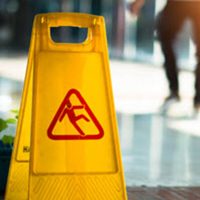Comparative Negligence in South Carolina Slip and Fall Cases

Slip and fall accidents are quite common. Unfortunately, a slip-and-fall accident can result in severe injuries. While many falls do not result in injuries, one out of five falls causes severe injuries, such as head injuries and broken bones. Such injuries can make it hard for a person to perform daily activities or live alone. Fortunately, after falling on someone else’s property because of their negligence, you may be eligible to file a slip and fall claim against the property owner and recover damages. When it comes to slip-and-fall claims, it is crucial to note that a number of laws can impact your ability to file a claim. One of the laws that can impact your ability to file a South Carolina slip and fall claim is the comparative negligence law.
Modified Comparative Negligence in SC Slip and Fall Cases
Under the comparative negligence principle, when more than one party is at fault for causing an accident or harm, the degree of fault of each party is assessed, and each party is assigned a percentage of responsibility. There are generally two types of comparative negligence rules. They are;
- Pure comparative negligence
- Modified comparative negligence.
Some states use the pure comparative negligence rule, whereas others use the modified comparative negligence rule. With the pure comparative negligence rule, an injured party can recover compensation regardless of the percentage of fault assigned to them. Even if the injured party is mostly at fault, they can still recover compensation. On the other hand, states that follow the modified comparative negligence rule only allow an injured person to recover compensation if their percentage of fault is equal to or less than a certain threshold. South Carolina follows the modified comparative negligence rule.
The 51% Bar Rule
When it comes to modified comparative negligence, some states follow the 50% bar rule, and others follow the 51% bar rule. The 50% bar rule prevents injured parties from recovering compensation if they are 50% or more at fault, whereas the 51% bar rule prevents injured parties from recovering damages if they are 51% or more at fault. South Carolina is one of the states that follows the 51% bar rule. South Carolina law states that a defendant is only liable if they are less than 50% at fault for the accident. So, if you suffer injuries in a South Carolina slip and fall accident, you can only receive compensation if you are 50% or less at fault for the accident.
While you may still be eligible to recover compensation in a South Carolina slip and fall case, even if you are partially at fault for your accident, your compensation will be reduced by the percentage of your fault. For example, suppose you are found to be 20% at fault. In such a case, the property owner will be assigned 80% of the blame, and your damages will be reduced by 20%.
If you were involved in a slip and fall accident, it is crucial that you seek legal counsel. If the defendant tries to use the comparative negligence defense, an attorney will know how to defend you and ensure you recover the compensation you deserve.
Contact Us for Legal Help
If you’ve suffered injuries in a South Carolina slip and fall accident, our skilled Charleston personal injury lawyer at Gus Anastopoulo Law Firm can help protect your right to compensation. Contact us today to schedule a consultation.
Source:
cdc.gov/falls/facts.html#:~:text=But%20one%20out%20of%20five%20falls%20does%20cause%20a%20serious%20injury%20such%20as%20a%20broken%20bone%20or%20a%20head%20injury

